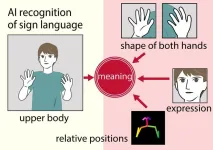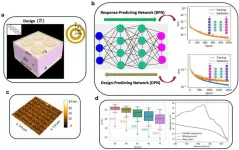(Press-News.org) PHILADELPHIA, PA (January 15, 2025) - Can memory influence what and how much we eat? A groundbreaking Monell Chemical Senses Center study, which links food memory to overeating, answered that question with a resounding “Yes.” Led by Monell Associate Member Guillaume de Lartigue, PhD, the research team identified, for the first time, the brain’s food-specific memory system and its direct role in overeating and diet-induced obesity.
Published in Nature Metabolism, they describe a specific population of neurons in the mouse brain that encode memories for sugar and fat, profoundly impacting food intake and body weight. “In today’s world, we are constantly bombarded with advertisements and environmental triggers designed to remind us of pleasurable food experiences,” said Dr. de Lartigue. “What’s surprising is that we’ve pinpointed a specific population of neurons in the hippocampus that not only forms these food-related memories but also drives our eating behavior. This connection could have significant implications for body weight and metabolic health.”
These neurons encode memories of the spatial location of nutrient-rich foods, acting as a “memory trace,” particularly for sugar and fat. Silencing these neurons impairs an animal's ability to recall sugar-related memories, reduces sugar consumption, and prevents weight gain, even when animals are exposed to diets that contribute to excessive weight gain. Conversely, reactivating these neurons enhances memory for food, increasing consumption and demonstrating how food memories influence dietary behavior.
These findings introduce two new concepts: first, evidence that specific neurons in the brain store food-related memories, and second, that these memories directly impact food intake. “While it’s no surprise that we remember pleasurable food experiences, it was long assumed that these memories had little to no impact on eating behavior,” said Dr. de Lartigue. “What’s most surprising is that inhibition of these neurons prevents weight gain, even in response to diets rich in fat and sugar.”
Memory’s Underappreciated Role
Memory is often overlooked as a key driver of food intake, but this study demonstrates a direct link between memory and metabolism. What sets this discovery apart from other studies related to memory is its implications for understanding metabolic health. Deleting sugar-responsive neurons in the hippocampus of the animals not only disrupts memory but also reduces sugar intake and protects against weight gain, even when animals are exposed to high-sugar diets. This highlights a direct link between certain brain circuits involved in memory and metabolic health, which has been largely overlooked in the field of obesity research.
“Memory systems in the hippocampus evolved to help animals locate and remember food sources critical for survival,” said first author Mingxin Yang, a University of Pennsylvania doctoral student in the de Lartigue lab. “In modern environments, where food is abundant and cues are everywhere, these memory circuits may drive overeating, contributing to obesity.”
Specific, Yet Independent Circuits
Another key discovery is that food-related memories are highly specific. Sugar-responsive neurons encode and influence only sugar-related memories and intake, while fat-responsive neurons impact only fat intake. These neurons do not affect other types of memory, such as spatial memory for non-food-related tasks.
“The specificity of these circuits is fascinating,” said de Lartigue. “It underscores how finely tuned the brain is for linking food to behavior, ensuring animals can differentiate between various nutrient sources in their environment.” We have separate types of neurons that encode memory for foods rich in fat versus memory for foods rich in sugar. These separate systems presumably evolved because foods in nature rarely contain both fat and sugar, surmise the authors.
Implications for Treating Obesity
The study’s findings open new possibilities for addressing overeating and obesity. By targeting hippocampal memory circuits, it may be possible to disrupt the memory triggers that drive consumption of unhealthy, calorie-dense foods.
“These neurons are critical for linking sensory cues to food intake,” said Dr. de Lartigue. “Their ability to influence both memory and metabolism makes them promising targets for treating obesity in today’s food-rich world.”
This collaborative study was conducted with colleagues from the University of Pennsylvania and the University of Southern California and was supported by the National Institutes of Health and the American Heart Association.
About Monell Chemical Senses Center
The Monell Chemical Senses Center is an independent nonprofit research institute in Philadelphia, Pennsylvania. Founded in 1968, its mission is to advance and share discoveries in the science of the chemical senses of smell, taste, chemesthesis, and interoception to solve world health, societal, and environmental challenges.
Follow us on
Facebook | LinkedIn | Instagram | Twitter/X | YouTube
END
Memory systems in the brain drive food cravings that could influence body weight
New research uncovers neurons in the hippocampus that encode memories of sugar and fat, shaping feeding behavior and metabolic health
2025-01-15
ELSE PRESS RELEASES FROM THIS DATE:
Indigenous students face cumbersome barriers to attaining post-secondary education
2025-01-15
Indigenous students identified inadequate funding as a major barrier to completing post-secondary education according to a new study published in AlterNative: An International Journal of Indigenous Peoples.
The study surveyed Indigenous university students at Algoma University. The students, who identified as either First Nations or Métis, reported that they required multiple sources of funding, including government student loans and personal savings, to afford their post-secondary education. About two-thirds (69%) of students received funding for their education from First Nations sources, including funding from federal programs for Indigenous students.
“This ...
Not all Hot Jupiters orbit solo
2025-01-15
Hot Jupiters are giant planets initially known to orbit alone close to their star. During their migration towards their star, these planets were thought to accrete or eject any other planets present. However, this paradigm has been overturned by recent observations, and the final blow could come from a new study led by the University of Geneva (UNIGE). A team including the National Centre of Competence in Research (NCCR) PlanetS, the Universities of Bern (UNIBE) and Zurich (UZH) and several foreign universities has just announced the existence of a planetary system, WASP-132, ...
Study shows connection between childhood maltreatment and disease in later life
2025-01-15
University of Birmingham venture Dexter has demonstrated the power of its Dexter software platform in a study showing that people whose childhoods featured abuse, neglect or domestic abuse carry a significantly increased risk of developing rheumatoid arthritis or psoriasis in later life.
The starting point for the recently published study was a database of over 16 million Electronic Health Records, from which the Dexter software defined a cohort, one arm that was exposed to childhood maltreatment, and one arm that was not.
The software then checked the records over a 26-year period ...
Discovery of two planets sheds new light on the formation of planetary systems
2025-01-15
The discovery of two new planets beyond our solar system by a team of astronomers from The University of Warwick and the University of Geneva (UNIGE), is challenging scientific understanding of how planetary systems form.
The existence of these two exoplanets - an inner super-Earth and an outer icy giant planet - within the WASP-132 system is overturning accepted paradigms of how ‘hot Jupiter’ planetary systems form and evolve.
Hot Jupiters are planets with masses similar to those of Jupiter, but which orbit closer to their star than Mercury orbits the Sun. There is not enough gas and dust for these giant planets to form ...
New West Health-Gallup survey finds incoming Trump administration faces high public skepticism over plans to lower healthcare costs
2025-01-15
WASHINGTON, D.C. — Weddnesday, Jan. 15, 2025 — Nearly half of Americans (46%) think the country is headed in the wrong direction when it comes to the incoming president’s policies to lower healthcare costs, while 31% say it’s on the right track, according to the latest West Health-Gallup survey released today.
When viewed through a political lens, only Republicans are more positive than negative about the future of healthcare costs under the Trump administration; nearly three-quarters (73%) think the incoming administration’s healthcare policies are headed in the right direction. In contrast, 24% of independents and 3% of Democrats say the same. Democrats ...
Reading signs: New method improves AI translation of sign language
2025-01-15
Sign languages have been developed by nations around the world to fit the local communication style, and each language consists of thousands of signs. This has made sign languages difficult to learn and understand. Using artificial intelligence to automatically translate the signs into words, known as word-level sign language recognition, has now gained a boost in accuracy through the work of an Osaka Metropolitan University-led research group.
Previous research methods have been focused on capturing information about the signer’s ...
Over 97 million US residents exposed to unregulated contaminants in their drinking water
2025-01-15
Nearly a third of people in the U.S. have been exposed to unregulated contaminants in their drinking water that could impact their health, according to a new analysis by scientists at Silent Spring Institute. What’s more, Hispanic and Black residents are more likely than other groups to have unsafe levels of contaminants in their drinking water and are more likely to live near pollution sources.
The findings, published in the journal Environmental Health Perspectives, add to growing concern about the quality of drinking water in the United States and the disproportionate impact of contamination ...
New large-scale study suggests no link between common brain malignancy and hormone therapy
2025-01-15
CLEVELAND, Ohio (Jan 15, 2025)–It’s not easy being a woman. Just look at the statistics. Women are more likely to have such debilitating conditions as osteoporosis, migraines, Alzheimer disease, depression, multiple sclerosis, and brain tumors. Sex hormones are often blamed. However, a new study suggests no link between hormone therapy (HT) and common brain tumors known as gliomas. Results of the study are published online today in Menopause, the journal of The Menopause Society.
The debate over the risks and benefits ...
AI helps to identify subjective cognitive decline during the menopause transition
2025-01-15
CLEVELAND, Ohio (Jan 15, 2025)—Artificial intelligence (AI) is positioned to make a major impact on almost every industry, including healthcare. A new study suggests that machine learning models can more quickly and affordably identify women with severe subjective cognitive decline during the menopause transition, effectively opening the door to better management of cognitive health. Results of the study are published online today in Menopause, the journal of The Menopause Society.
Subjective cognitive decline refers to a person’s ...
Machine learning assisted plasmonic absorbers
2025-01-15
Light absorption is a cornerstone for several applications such as solar cells, photodetectors, and optical sensors, to name a few. Yet, the trade-off between the thickness of the absorber and its efficiency has long limited the performance of such devices. The goal in this investigation is to get the best of both worlds—ultra-thin materials with maximized absorption.
In a recent paper published in Light: Science & Applications, a group of researchers from King Abdullah University of Science and Technology (KAUST), led by Prof. Ying Wu and Prof. Xiangliang Zhang (now at University of Notre Dame), successfully put forward an efficient broadband light absorber ...
LAST 30 PRESS RELEASES:
Weight-loss wonder pills prompt scrutiny of key ingredient
Nonprofit leader Diane Dodge to receive 2026 Penn Nursing Renfield Foundation Award for Global Women’s Health
Maternal smoking during pregnancy may be linked to higher blood pressure in children, NIH study finds
New Lund model aims to shorten the path to life-saving cell and gene therapies
Researchers create ultra-stretchable, liquid-repellent materials via laser ablation
Combining AI with OCT shows potential for detecting lipid-rich plaques in coronary arteries
SeaCast revolutionizes Mediterranean Sea forecasting with AI-powered speed and accuracy
JMIR Publications’ JMIR Bioinformatics and Biotechnology invites submissions on Bridging Data, AI, and Innovation to Transform Health
Honey bees navigate more precisely than previously thought
Air pollution may directly contribute to Alzheimer’s disease
Study finds early imaging after pediatric UTIs may do more harm than good
UC San Diego Health joins national research for maternal-fetal care
New biomarker predicts chemotherapy response in triple-negative breast cancer
Treatment algorithms featured in Brain Trauma Foundation’s update of guidelines for care of patients with penetrating traumatic brain injury
Over 40% of musicians experience tinnitus; hearing loss and hyperacusis also significantly elevated
Artificial intelligence predicts colorectal cancer risk in ulcerative colitis patients
Mayo Clinic installs first magnetic nanoparticle hyperthermia system for cancer research in the US
Calibr-Skaggs and Kainomyx launch collaboration to pioneer novel malaria treatments
JAX-NYSCF Collaborative and GSK announce collaboration to advance translational models for neurodegenerative disease research
Classifying pediatric brain tumors by liquid biopsy using artificial intelligence
Insilico Medicine initiates AI driven collaboration with leading global cancer center to identify novel targets for gastroesophageal cancers
Immunotherapy plus chemotherapy before surgery shows promise for pancreatic cancer
A “smart fluid” you can reconfigure with temperature
New research suggests myopia is driven by how we use our eyes indoors
Scientists develop first-of-its-kind antibody to block Epstein Barr virus
With the right prompts, AI chatbots analyze big data accurately
Leisure-time physical activity and cancer mortality among cancer survivors
Chronic kidney disease severity and risk of cognitive impairment
Research highlights from the first Multidisciplinary Radiopharmaceutical Therapy Symposium
New guidelines from NCCN detail fundamental differences in cancer in children compared to adults
[Press-News.org] Memory systems in the brain drive food cravings that could influence body weightNew research uncovers neurons in the hippocampus that encode memories of sugar and fat, shaping feeding behavior and metabolic health




